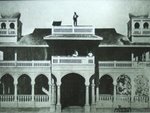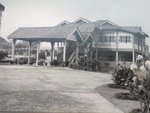Rather, he appointed a committee of six honourable individuals whom he ordered to elect a Khalifah (the head of Muslim nation) from amongst themselves. He clearly warned them against choosing his son 'Abdullah ibn 'Umar who was also on the committee.
'Umar chose these six people based on his knowledge that the Prophet had departed this world feeling pleased with every single one of them. This was the best way for the successor to be chosen. For 'Umar to merely appoint a successor - as requested to him - would have established a wrong tradition and could have let to dissent and controversy. 'Umar also put the issue into the most capable and knowledgeable Companions of the Prophet and left it for them to choose one from amongst themselves. These six all knew from the Prophet's teachings the requirement to consult the Muslims in their affairs; they had done this but ultimately it was within this committee of six that the decision was made.
After Abu Bakr and 'Umar ibn Khattab, 'Uthman ibn 'Affan, then 68-year-old, was officiated as the third Khalifah in 644 AD or 12 years after the Prophet passed away.
Not only was he among the closest companions, 'Uthman was a son-in-law to the Prophet, twice. After Ruqayyah died, the Prophet consented to ask 'Uthman to marry another of his daughters, Ummu Kulthum. "If she died and I still have daughter, I would like 'Uthman to marry her too," the Prophet stated to show his respect to 'Uthman's personal quality.
Even before he embraced Islam, 'Uthman was a man of honest and respectful ways. He had never committed fornication before or after the coming of Islam, nor did he ever want another religion apart from Islam, nor had he killed anyone.
Even though he was famous for his business and leadership ability, 'Uthman was a man of great modesty. One day, the Prophet was lying down in his house with his thighs or his calves exposes. Abu Bakr - and later 'Umar - asked permission to enter and was permitted while the Prophet was in that position and he came in and spoke with them. When 'Uthman asked permission, the Prophet sat up and straightened his clothing. He was then given permission. 'Uthman came in spoke with the Prophet.
The Prophet's wife Aisha bint Abu Bakr asked why he treated 'Uthman differently. The Prophet answered, "Should I not be shy of a man around whom the angels are shy (because of his modesty)?"
The Prophet informed his companions of two things regarding 'Uthman's future: entering paradise after facing a great calamity. Abu Musa Al-Ash'ari was in the company of the Prophet in one of the gardens of Madinah. In the Prophet's hand there was a stick, and he was striking slowly the water and the mud with it.
Abu Musa said, "A man came (at the gate of the garden) and asked permission to enter. The Prophet said, 'Open the gate for him and give him the glad tidings of entering Paradise'."
Abu Musa related, "I went, and behold! It was Abu Bakr. So I opened the gate and informed him of the glad tidings of entering Paradise. Then another man came and asked permission to enter. The Prophet said, 'Open the gate for him and give him the glad tidings of entering Paradise.' Behold! It was 'Umar. So I opened the gate for him and gave him the glad tidings of entering Paradise. Then another man came and asked permission to enter."
"The Prophet was sitting in a leaning posture, so he sat up and said, 'Open the gate for him and give him the glad tidings of entering Paradise with a calamity which will befall him or which will take place'. I went, and behold! It was 'Uthman. So I opened the gate for him and gave him the glad tidings of entering Paradise and also informed him of what the Prophet had said (about a calamity)."
He answered, "I only seek Allah's help." He was killed 12 years after being appointed as Khalifah.

[Note: My apologies to the Brunei Times for publishing this without BT's permission. This article was written by Qaula Thaqila and was published on 18th May 2007 in The Brunei Times.]











